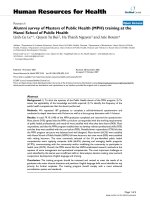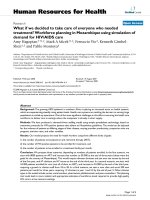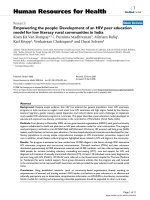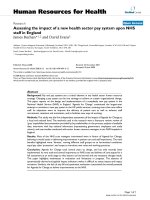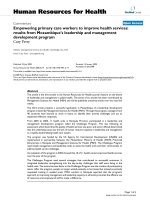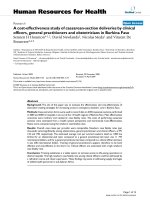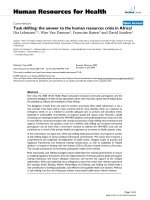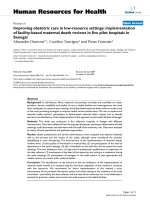báo cáo sinh học:" Empowering primary care workers to improve health services: results from Mozambique''''s leadership and management development program" docx
Bạn đang xem bản rút gọn của tài liệu. Xem và tải ngay bản đầy đủ của tài liệu tại đây (177.47 KB, 3 trang )
BioMed Central
Page 1 of 3
(page number not for citation purposes)
Human Resources for Health
Open Access
Commentary
Empowering primary care workers to improve health services:
results from Mozambique's leadership and management
development program
Cary Perry
Address: Management Sciences for Health, Cambridge, MA, USA
Email: Cary Perry -
Abstract
This article is the third article in the Human Resources for Health journal's feature on the theme
of leadership and management in public health. The series of six articles has been contributed by
Management Sciences for Health (MSH) and will be published article-by-article over the next few
weeks.
The third article presents a successful application in Mozambique of a leadership development
program created by Management Sciences for Health (MSH). Through this program, managers from
40 countries have learned to work in teams to identify their priority challenges and act to
implement effective responses.
From 2003 to 2004, 11 health units in Nampula Province, participated in a leadership and
management development program called the Challenges Program. This was following an
assessment which found that the quality of health services was poor, and senior officials determined
that the underlying cause was the lack of human resource capacity in leadership and management
in a rapidly decentralizing health care system.
The program was funded by the US Agency for International Development (USAID) and
implemented in partnership between the Mozambican Ministry of Health (MOH) Provincial
Directorate in Nampula and Management Sciences for Health (MSH). The Challenges Program
used simple management and leadership tools to assist the health units and their communities to
address health service challenges.
An evaluation of the program in 2005 showed that 10 of 11 health centers improved health services
over the year of the program.
The Challenges Program used several strategies that contributed to successful outcomes. It
integrated leadership strengthening into the day-to-day challenges that staff were facing in the
health units. The second success factor in the Challenges Program was the creation of participatory
teams. After the program, people no longer waited passively to be trained but instead proactively
requested training in needed areas. MOH workers in Nampula reported that the program's
approach to improving management and leadership capacity at all levels promoted the efficient use
of resources and empowered staff to make a difference.
Published: 23 July 2008
Human Resources for Health 2008, 6:14 doi:10.1186/1478-4491-6-14
Received: 15 January 2008
Accepted: 23 July 2008
This article is available from: />© 2008 Perry; licensee BioMed Central Ltd.
This is an Open Access article distributed under the terms of the Creative Commons Attribution License ( />),
which permits unrestricted use, distribution, and reproduction in any medium, provided the original work is properly cited.
Human Resources for Health 2008, 6:14 />Page 2 of 3
(page number not for citation purposes)
Introduction
Health units in the Nampula Province of northern
Mozambique are located in remote areas far from the Pro-
vincial Directorate. Directives and funding from the cen-
tral MOH in Mozambique's capital, Maputo, arrive slowly
and sometimes not at all. Mozambican health workers
operate in areas of striking poverty, and managers work
diligently to stretch out their resources in an environment
with below-average health indicators, even for sub-Saha-
ran Africa. Infant mortality is high, and the HIV infection
rate had by 2002 climbed to a sobering national average
of more than 13%.
In 2002, senior administrators in the MOH identified a
lack of leadership and management capacity at all levels as
a cause of the low quality of health service delivery. They
recognized that to improve health services and the health
of the Mozambican population, especially in a newly
decentralized health system, they would need to invest in
human resources. Problems included a lack of communi-
cation between the provincial and district levels; low
employee morale; high staff turnover; a large demand for
services combined with a constant shortage of personnel;
and planning that was limited to lists of activities rather
than coordinated processes with measurable outcomes
and procedures for monitoring performance. The chal-
lenge at the health unit level, therefore, was to empower
employees to achieve change using simple tools in a very
low-resource environment.
The Program
From 2003 to 2004, 11 health units- representing six
health districts – in Nampula Province participated in a
leadership and management development program that
the health unit staff called the Challenges Program. The
program was implemented in partnership between the
MOH Provincial Directorate in Nampula and MSH. The
Challenges Program used simple management and lead-
ership tools to assist the health units and their communi-
ties to address health service challenges in family
planning, maternal and child health, and basic hygiene
and biosecurity.
The Challenges Program in the health units was launched
during a two-day Leadership Dialogue in Nampula Prov-
ince for 25 provincial and district health managers. The
goal of the Leadership Dialogue was to develop a sense of
ownership of the program by provincial, district, and
health unit managers. The dialogue also allowed the pro-
gram implementers to gauge the appropriate level of the
workshop materials for district and health unit partici-
pants, and it succeeded in communicating to participants
and facilitators that this program was about working in
teams to achieve results.
The program comprised four workshops of three to five
days each, with a fifth for evaluation. Each health unit sent
two or three staff members to the workshops. The first
workshop consisted of a combination of lectures, discus-
sions, individual and group exercises, and self-assess-
ments of leadership competencies. The topics included:
▪ Concepts of leadership and the MSH Leading and Man-
aging Framework
▪ Leadership strategies
▪ Organizational change
▪ Communication, coaching, and mentoring
▪ Negotiation
▪ Human motivation
▪ Teamwork
▪ Action planning.
Afternoon sessions focused on applying the theoretical
material to addressing health challenges. Participants
learned to use management and leadership tools such as
the Leading and Managing Framework, gap analysis, a pri-
ority matrix, the SMART Objectives Tool, an action plan-
ning template, and a client survey.
Discussion
MSH staff and provincial facilitators visited each health
unit at least monthly after the first workshop to support
the participants and assess progress. The MSH philosophy
of developing leaders at all levels meant that everyone
from medical technicians and nurses to drivers and house-
keeping staff participated in the program. Despite low lit-
eracy and staff inexperience with being included in
decisions, all but one of the health units successfully built
teams, applied the tools they had learned for selecting
challenges and developing action plans, and reported on
progress at the end of the year. In 2005 an evaluation
revealed that the five most successful health units
achieved the following in one year:
▪ one unit increased the percentage of attended births
from 25% to 35%;
▪ one unit increased the achievement of basic hygiene and
biosecurity standards by 67%;
▪ another unit reduced waiting time for pediatric visits by
2.5 hours and reduced errors in inpatient registries from
8.6 to zero;
Publish with Bio Med Central and every
scientist can read your work free of charge
"BioMed Central will be the most significant development for
disseminating the results of biomedical research in our lifetime."
Sir Paul Nurse, Cancer Research UK
Your research papers will be:
available free of charge to the entire biomedical community
peer reviewed and published immediately upon acceptance
cited in PubMed and archived on PubMed Central
yours — you keep the copyright
Submit your manuscript here:
/>BioMedcentral
Human Resources for Health 2008, 6:14 />Page 3 of 3
(page number not for citation purposes)
▪ one unit constructed a biomedical waste container;
▪ another unit built a kitchen.
The Medical Director of Nampula Provincial Directorate
noted that these "simple projects made a huge differ-
ence in the quality of care Health care improved greatly
for clients in the health units – the image of the health
units improved. What also improved was the confidence
of the population in the work of the health units."
Conclusion
The Challenges Program used several strategies that con-
tributed to successful outcomes. It integrated leadership
strengthening into the day-to-day challenges that workers
faced without taking them away for long periods of expen-
sive training. The program also offered decentralized
health units the opportunity to work with communities to
address the communities' needs. Despite having no oper-
ating budget for much of the program, 10 of the 11 partic-
ipating health units were able to achieve most of their
goals. In the process, the program created a culture of
results and gave managers and health care providers a
sense of control over their actions.
The second success factor in the Challenges Program was
the improvement in employee morale through the crea-
tion of participatory teams in a traditionally hierarchical
structure. After their participation in the program, people
no longer waited to be trained but instead asked for the
training they needed. Overall the health units that partic-
ipated in the project have taken a more active and positive
role than before to overcome their challenges. The direc-
tor of Mossuril Health Center commented that "What I
noticed from the very beginning was that the staff was very
motivated and they are still motivated because when
they are called to participate they really feel considered,
valued."
The most critical limiting factor for the health units was
the lack of resources. Chronic delays in the disbursement
of funds affected how ambitious the action plans could
be. The general low level of services forced staff to focus
on basic challenges such as improving cleanliness,
improving biosecurity, decreasing patients' waiting time,
and increasing the number of attended births. The health
units also had few skills in developing indicators to mon-
itor performance, although by the end of the program
they proudly presented simple graphs and tacked them up
in the health units for patients and staff to see.
MOH workers in Nampula are realistic when they speak
about Mozambique's substantial health challenges. But
they also report that the Challenges Program approach to
improving management and leadership at all levels has
promoted the efficient use of critical resources and, most
important, empowered staff to make a difference in their
own areas.
Competing interests
The author declares that they have no competing interests.
